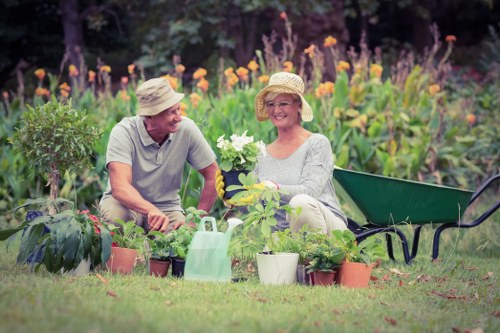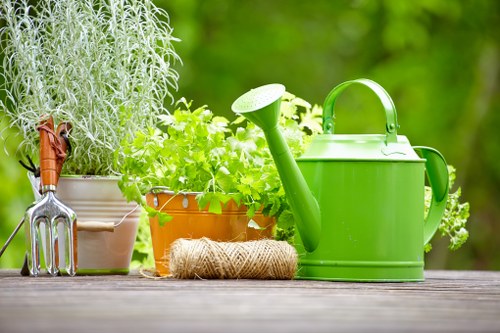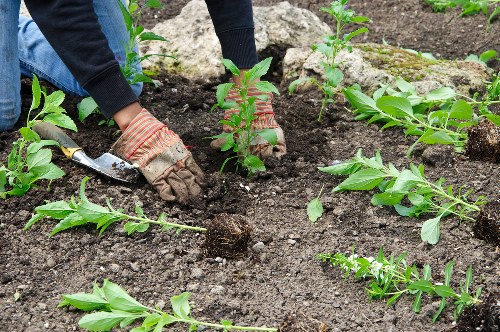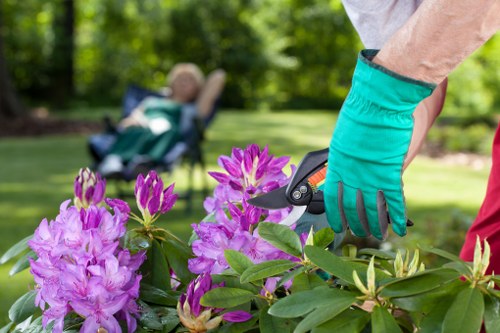Comprehensive Guide to Garden Maintenance in Downham

Introduction to Garden Maintenance
Maintaining a beautiful garden in Downham requires dedication, knowledge, and the right strategies. Whether you're a seasoned gardener or a novice, understanding the essentials of garden maintenance can transform your outdoor space into a flourishing paradise.
In Downham, the local climate and soil conditions play a significant role in how your garden should be cared for. This guide will walk you through the various aspects of garden maintenance, ensuring your garden remains vibrant and healthy all year round.
From seasonal tasks to pest control, and from soil management to plant selection, we've got you covered with expert tips tailored specifically for Downham's unique environment.

Seasonal Garden Maintenance
Spring Maintenance
Spring is a critical time for garden maintenance in Downham. As the weather warms up, it's essential to prepare your garden for the growing season.
Start by clearing away any debris from the winter months, such as fallen leaves and dead branches. This not only improves the garden's appearance but also prevents diseases and pests from taking hold.
Next, focus on soil preparation. Testing your soil's pH levels and nutrient content can help you determine what amendments are needed to promote healthy plant growth.

Summer Maintenance
During the summer months, consistent watering is crucial, especially during dry spells. Installing a drip irrigation system can help conserve water while ensuring your plants receive adequate moisture.
Regular weeding is also necessary to prevent invasive species from overshadowing your garden's desirable plants. Mulching can be an effective strategy to suppress weeds and retain soil moisture.
Additionally, summer is an excellent time for pruning. Removing dead or overgrown branches helps maintain plant health and encourages vigorous growth.

Autumn Maintenance
As the temperatures begin to drop, autumn garden maintenance focuses on preparing for the winter months. This includes harvesting late-season vegetables and fruits, as well as collecting seeds for the next planting season.
It's also a great time to plant spring bulbs, ensuring vibrant blooms in the coming year. Cleaning and storing garden tools can prolong their lifespan and ensure they're ready for use when needed.
Finally, apply a layer of compost or mulch to protect the soil from erosion and retain moisture during colder months.

Winter Maintenance
Winter garden maintenance in Downham involves protecting your plants from frost and heavy snowfall. Use frost blankets or horticultural fleece to shield sensitive plants during cold snaps.
Pruning should be minimal during winter, focusing only on removing any damaged or diseased branches. This helps prevent the spread of diseases and promotes healthy growth in the spring.
Indoor gardening can also be a rewarding activity during winter. Consider growing herbs or maintaining houseplants to keep your green thumb active even when outdoor gardening isn't feasible.
Essential Garden Maintenance Tasks
- Lawn Care: Regular mowing, aerating, and fertilizing keep your lawn healthy and lush.
- Weeding: Consistent weeding prevents unwanted plants from taking over your garden beds.
- Pest Control: Implement natural pest control methods to protect your plants without harming the environment.
- Soil Management: Regularly test and amend your soil to ensure optimal plant growth.
- Pruning and Trimming: Keep your plants in shape by removing dead or overgrown branches.

Choosing the Right Plants for Downham Gardens
Selecting the appropriate plants is crucial for successful garden maintenance. Consider native plants that are well-suited to Downham's climate and soil conditions.
Native plants typically require less maintenance, as they are adapted to the local environment. They also support local wildlife, contributing to a balanced ecosystem.
When choosing plants, take into account factors such as sunlight exposure, water requirements, and growth habits to ensure they thrive in your garden.

Perennials vs. Annuals
Understanding the difference between perennials and annuals can help you plan your garden effectively. Perennials return year after year, providing lasting structure and color.
Annuals, on the other hand, complete their life cycle in one season but often offer vibrant, bold colors. A mix of both can create a dynamic and visually appealing garden.
Consider incorporating a variety of plant types to ensure continuous blooming and interest throughout the growing season.

Vegetable and Herb Gardening
Growing your own vegetables and herbs can be both rewarding and practical. Ensure you allocate sufficient space and provide the necessary conditions for optimal growth.
Implement crop rotation practices to maintain soil fertility and reduce the risk of pests and diseases. Regular harvesting encourages plants to produce more yields.
Focus on varieties that are well-suited to Downham's climate for the best results.

Soil Preparation and Care
Healthy soil is the foundation of a thriving garden. Conducting regular soil tests helps you understand its pH levels and nutrient content.
Based on the test results, amend your soil with compost, manure, or other organic materials to improve its structure and fertility.
Aerating the soil allows better water infiltration and root growth, promoting stronger and healthier plants.

Pest and Disease Management
Effective pest and disease management is essential for maintaining a healthy garden. Monitor your plants regularly for signs of infestation or illness.
Implement integrated pest management (IPM) strategies, which combine biological, cultural, and mechanical controls to minimize pest populations.
Encourage beneficial insects, such as ladybugs and bees, which help control pest populations naturally.
Tools and Equipment for Garden Maintenance
- Pruners: Essential for trimming and shaping plants.
- Rakes: Useful for clearing debris and leveling soil.
- Shovels: Necessary for digging and planting.
- Watering Systems: Includes hoses, sprinklers, and drip irrigation setups.
- Garden Gloves: Protect your hands from thorns, dirt, and pests.
Choosing the Right Tools
Selecting high-quality tools can significantly impact your garden maintenance efficiency. Invest in durable, ergonomic tools that reduce strain and enhance performance.
Regularly clean and maintain your tools to extend their lifespan and ensure they function optimally.
Consider the specific needs of your garden when choosing tools, ensuring you have the right equipment for each task.

Watering Strategies for Downham Gardens
Proper watering is vital for plant health, especially in varying Downham weather conditions. Understanding your garden's specific water needs helps prevent overwatering or underwatering.
Implementing efficient watering systems, such as drip irrigation or soaker hoses, can conserve water while ensuring plants receive consistent moisture.
Watering early in the morning reduces evaporation and allows plants to absorb the necessary moisture before the day's heat.

Rainwater Harvesting
Harvesting rainwater is an eco-friendly way to water your garden. Installing rain barrels can collect and store rainwater, providing a sustainable water source for your plants.
Rainwater is naturally soft and free of chlorine and other chemicals, making it ideal for most plants.
Ensure your rainwater harvesting system is properly maintained to prevent contamination and ensure efficient water collection.

Mulching Techniques
Mulching offers numerous benefits, including moisture retention, temperature regulation, and weed suppression. Applying a layer of organic mulch, such as wood chips or straw, enhances soil structure and fertility as it decomposes.
Avoid piling mulch directly against plant stems or tree trunks to prevent rot and pest issues.
Refresh mulch layers annually to maintain their effectiveness and appearance.
Pruning and Trimming
Regular pruning and trimming are essential for maintaining plant health and aesthetics. Removing dead or diseased branches prevents the spread of diseases and encourages new growth.
Proper pruning techniques vary depending on the plant type. Research specific needs to ensure you’re not inadvertently harming your plants.
Invest in high-quality pruning tools to make clean cuts that promote quicker healing and reduce the risk of infection.

Integrated Pest Management (IPM)
IPM is a sustainable approach to managing pests by combining biological, cultural, and mechanical methods. It minimizes the reliance on chemical pesticides, promoting a healthier garden ecosystem.
Identify pests accurately to determine the most effective control methods. Misidentification can lead to ineffective treatments and harm beneficial insects.
Encourage natural predators, such as birds and beneficial insects, which help keep pest populations in check.

Biological Controls
Introducing beneficial organisms, like ladybugs and predatory beetles, can naturally reduce pest populations. These biological controls are an environmentally friendly alternative to chemical pesticides.
Ensure a diverse garden environment to support a variety of beneficial insects, promoting a balanced ecosystem.
Avoid broad-spectrum pesticides that can harm both pests and beneficial insects, disrupting the natural balance.
Soil Health and Composting
Maintaining soil health is fundamental to a thriving garden. Incorporate organic matter through composting to enhance soil structure, fertility, and microbial activity.
Starting a compost pile is simple: combine kitchen scraps, garden waste, and other organic materials. Regularly turning the pile accelerates decomposition and ensures consistent compost quality.
Use compost as a natural fertilizer, enriching your soil without the need for chemical additives.

Garden Design and Layout
A well-designed garden not only looks appealing but also facilitates easier maintenance. Plan your garden layout with functionality in mind, ensuring efficient access for tasks like watering, pruning, and harvesting.
Incorporate pathways and raised beds to organize plant areas and reduce soil compaction.
Select focal points and complementary plant groupings to create visual interest and harmony within your garden.

Creating Wildlife-Friendly Gardens
Encouraging wildlife in your Downham garden enhances its biodiversity and ecological balance. Plant a variety of flowering plants to attract pollinators like bees and butterflies.
Provide habitats for birds and beneficial insects by installing birdhouses, bee hotels, and water features.
Minimize the use of pesticides to create a safe environment for wildlife to thrive.

Sustainable Gardening Practices
Adopting sustainable gardening practices not only benefits the environment but also ensures the long-term health of your garden. This includes water conservation, soil preservation, and the use of eco-friendly materials.
Implementing techniques like rainwater harvesting, mulching, and composting contributes to a more sustainable and resilient garden.
Choose native and drought-resistant plants to reduce water usage and maintenance efforts.

Reducing Chemical Use
Minimize the use of chemical fertilizers and pesticides by opting for natural alternatives. Organic fertilizers and pest control methods support a healthy garden ecosystem.
Employ crop rotation and companion planting to naturally deter pests and improve soil health.
Regularly monitor plant health to address issues early, reducing the need for chemical interventions.
Hiring Professional Garden Maintenance Services
For those who prefer expert assistance, professional garden maintenance services in Downham offer a range of solutions to keep your garden in pristine condition.
Professionals can provide tailored maintenance plans, ensuring your garden receives the care it needs throughout the year.
Hiring experts saves time and ensures that maintenance tasks are performed efficiently and effectively.

Benefits of Professional Services
Professional garden maintenance services bring expertise and experience, leading to better garden health and aesthetic appeal.
They can identify and address issues that may not be apparent to amateur gardeners, preventing potential problems from escalating.
Additionally, professionals often have access to specialized tools and resources, enhancing the overall quality of maintenance.
DIY vs. Professional Maintenance
Deciding between DIY garden maintenance and hiring professionals depends on various factors, including time, expertise, and budget.
While DIY allows for personal involvement and cost savings, it requires significant time and knowledge to execute effectively.
Professional services offer convenience and expertise but come at a higher financial cost. Assess your priorities to make the best choice for your garden.
Conclusion
Effective garden maintenance in Downham involves a combination of regular tasks, strategic planning, and adopting sustainable practices. Whether you choose to maintain your garden yourself or enlist professional help, understanding the essentials ensures a beautiful and healthy outdoor space.
By following the guidelines outlined in this guide, you can achieve a flourishing garden that enhances your home's aesthetic and provides a peaceful retreat year-round.
Contact us today to learn more about our garden maintenance services and how we can help transform your Downham garden into a stunning masterpiece.
